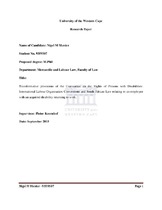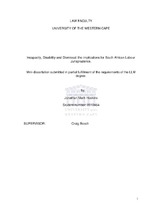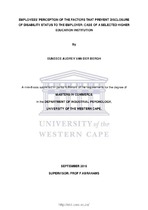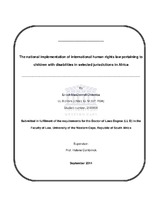Transformative provisions of the Convention on the Rights of Persons with Disabilities : International Labour Organisation conventions and South African law relating to an employee with an acquired disability returning to work
| dc.contributor.advisor | Koornhof, Pieter | |
| dc.contributor.author | Mentor, Nigel M | |
| dc.date.accessioned | 2016-12-08T12:50:29Z | |
| dc.date.available | 2016-12-08T12:50:29Z | |
| dc.date.issued | 2015 | |
| dc.identifier.uri | http://hdl.handle.net/11394/5353 | |
| dc.description | Magister Legum - LLM | en_US |
| dc.description.abstract | South Africa has a total population of 52.98 million of which roughly 7.5% have a disability. In relation to the population of persons with disabilities, the Department of Labour reports that 0.9% of the workforce consists of persons with disabilities. Disabilities are diverse and, without limiting the scope relating to the diversity of disability as it applies to the individual, includes persons with psycho-social, visual, language, hearing, intellectual and orthopaedic impairments. Conroy adds that most disabilities are acquired in adult life. Disabilities are usually acquired via injuries on duty, age, HIV/AIDS, extensively multi-drug resistant TB, diabetes or other long term illnesses. Within the South African labour law context, a distinction is made based on whether an acquired disability occurs at a workplace, as it may be relevant when evaluating the capacity of an employee for purposes of dismissal. | |
| dc.language.iso | en | en_US |
| dc.publisher | Universityof the Western Cape. | en_US |
| dc.subject | Acquired disabilities | en_US |
| dc.subject | International Labour Organisation | en_US |
| dc.subject | Disability rights | en_US |
| dc.subject | Convention on the Rights of Persons with disabilities | en_US |
| dc.subject | Human rights | en_US |
| dc.title | Transformative provisions of the Convention on the Rights of Persons with Disabilities : International Labour Organisation conventions and South African law relating to an employee with an acquired disability returning to work | en_US |
| dc.rights.holder | Universityof the Western Cape. | en_US |




